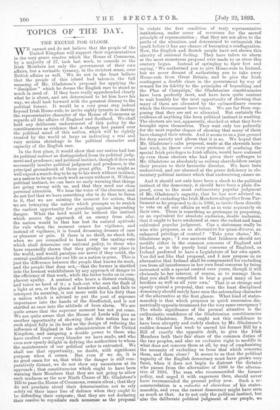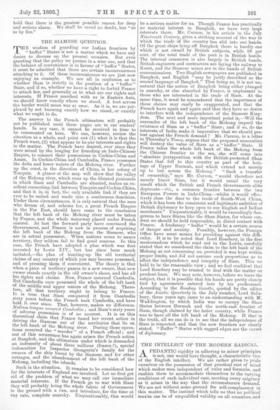TOPICS OF THE DAY.
THE EXCUSE FOR GLOOM.
WE cannot and do not believe that the people of the United Kingdom will support their representatives in the very grave resolve which the House of Commons, by a majority of 27, took last week, to concede to the Irish Members not only the government of their own affairs, but a veritable tyranny, in the strictest sense, over British affairs as well. We do not in the least believe that the people of this island had taken-in the full meaning of Mr. Gladstone's proposal for applying the " discipline" which he deems the English race to stand so much in need of. If they have really apprehended clearly what he is about, and. are determined to let him have his way, we shall look forward with the greatest dismay to the political future. It would be a very great step indeed beyond Irish Home-rule, to invite eighty tyrants to destroy the representative character of the House of Commons as regards all the affairs of England and Scotland. We shall hold any deliberate endorsement of this policy by the constituencies as evidence that a change has passed over the political mind of this nation, which will be rightly treated by the world at large as indicating a real and very serious shrinkage in the political character and capacity of the English race.
In the first place, it would show that our nation had lost its political instinct as distinguished from its political judg- ment and prudence; and political instinct, though it does not necessarily involve political judgment and prudence, is the principal groundwork of those great gifts. You might as well expect awatch-dog to be up to his work without instinct, as a nation to be up to such work as ours without it. Without political instinct, we can have no early warning that things are going wrong with us, and that they need our close personal attention. We hear the voice of the charmer, and do not feel that we have something else to do than to listen to it, that we are missing the moment for action, that we are betraying the nature which prompts us to snatch the earliest opportunity for guarding against impending danger. What the herd would be without the instinct which scents the approach of an enemy from afar, the nation would be that has lost its natural aptitude for rule when the moment comes for vigilance, and instead of vigilance, it is found dreaming dreams of ease or pleasure or gain. If there is no thrill, no shock felt, when we are counselled to hand over the casting-vote which shall determine our national policy, to those who have repeatedly shown that they grudge us our place in the world, and would paralyse our nerve if they could, the central qualification for our life as a nation is gone. This is just the difference between the people that knows its work, and the people that does not,—that the former is startled into the keenest watchfulness by any approach of danger to the efficiency of that work, while the-latter looks on in com- placent apathy. A sentinel who hears a distant rushing, and takes no heed of it ; a look-out who sees the flash of a light at sea, or the gleam of breakers ahead, and fails to interpret its meaning, is not more unfit for his duty than a nation which is advised to put the post of supreme importance into the hands of the disaffected, and is not startled at once into the attitude of keen alarm. We are quite aware that the supreme moment has not yet come. We are quite aware that the House of Lords will give us another opportunity of showing that this nation has no such abject folly in its head as the design of reducing the influence of England in the administration of the United Kingdom, and assigning a double power to those who have exulted over every blunder we have made, and 'Who even now openly delight in defying the authorities to whom the maintenance of our political order is entrusted. We shall use that opportunity, no doubt, with significant purpose when it comes. But even if we do, it is no good omen for us, that while the danger is still com- paratively distant, we do not show any uneasiness at its approach ; that constituencies which ought to have been warning their Members that they are not going to allow such madness as the new Ninth Clause of Mr. Gladstone's Bill to pass the House of Commons, remain silent ; that they do not proclaim aloud their determination not to rely solely on their inner line of defence when they ought to be defending their outposts ; that they are not declaring their resolve to repudiate such nonsense as the proposal to violate the first condition of truly representative' institutions, under cover of reverence for the sacred principle of representation ; that they are not alive to the perils of the situation, and determined to extinguish the spark before it has any chance of becoming a conflagration. Now, the English and Scotch people have not shown this alacrity of national feeling. They have taken no alarm at the most monstrous proposal ever made to us since this century began. Instead of springing to their feet and saying, We authorised you to give Home-rule to Ireland, but we never dreamt of authorising you to take away Home-rule from Great Britain, and to give the Irish contingent a double share in the government by way of reward for its fidelity to the principles of boycotting and the Plan of Campaign,' the Gladstonian constituencies have been perfectly inert, and have been quite content to wait humbly for the next opportunity of showing that many of them are alienated by the extraordinary course which the Government have taken. We are far from sup- posing that they are not so alienated. But certainly the evidence of anything like keen political instinct is wanting. The electors are -not, apparently, shocked at what they have brought upon themselves. They wait only too patiently for the next regular chance of showing that many of them have changed their minds. And it seems to us a just ground for deep anxiety and gloom that it is so. We hoped that Mr. Gladstone's calm proposal, made at the eleventh hour last week, to throw over every pretence of confining the special Irish privileges to Irish affairs, would have wakened up even those electors who had given their suffrages to, Mr. Gladstone as absolutely as railway shareholders assign their proxies to their favourite director. We have been undeceived, and are alarmed at the grave deficiency in ele- mentary political instinct which that undeceiving causes us.
And it should not only have been a shock to the political instinct of the democracy, it should have been a plain dis- proof, even to the most rudimentary popular judgment of Mr. Gladstone's sagacity, that he has now advised us, instead of excluding the Irish Members altogether from Par- liament as he proposed to do in 1886, to invite them directly to vote on all our affairs as well as to vote separately on their own. There is something so grotesque in proposing, as an equivalent for absolute exclusion, doubts inclusion, that it ought to have awakened at once the rudest and least cultivated popular judgment. Can a statesman really be wise who proposes, as an alternative for quasi-divorce, an enhanced privilege of control ? 'Take your choice,' Mr. Gladstone says ; 'I was anxious that Irishmen should not meddle either in the common concerns of England and Ireland, or in the purely local concerns of England, as Ireland preferred to have a Legislature of her own apart. You did not like that proposal, and I now propose as an alternative that Ireland shall be compensated for excluding you from all interference in her own local concerns by being entrusted with a special control over yours, though it will obviously be her interest, of course, so to manage them that you shall be compelled to bear a good many of her burdens as well as all your own.' That is so strange and openly cynical a proposal, that even the least disciplined democracy should surely have seen the astounding character of the alternative at the first glance. What kind of states- manship is that which proposes in quick succession dia- metrically opposite treatment for the very same emergency ? The whole significance of the present situation is the enthusiastic confidence of the Gladstonian constituencies in Mr. Gladstone. Now, ought not this confidence to have been abruptly and rudely shaken by Mr. Gladstone's sudden demand last week to amend his former Bill by a Bill of exactly the opposite drift, to give the Irish Members both their fair share of the common duties of the two peoples, and also an exclusive right to meddle in what does not concern them at all, by way of emphasising the necessity of excluding us from that which concerns them, and them alone ? It seems to us that the political sagacity of the English democracy must have grown very faint, when it does not begin to distrust the dictator who passes from the alternative of 1886 to the alterna- tive of 1893. The man who recommended the former policy, and urged it with eagerness then, should never have recommended the present policy now. Such a re- commendation is a reductio ad absurdum of his states- manship, and even the rawest democracy might have seen as much as that. As to not only the political instinct, but also the deliberate political judgment of our people, we hold that there is the greatest possible reason for deep and serious alarm. We shall be saved no doubt, but "so as by fire."



































 Previous page
Previous page